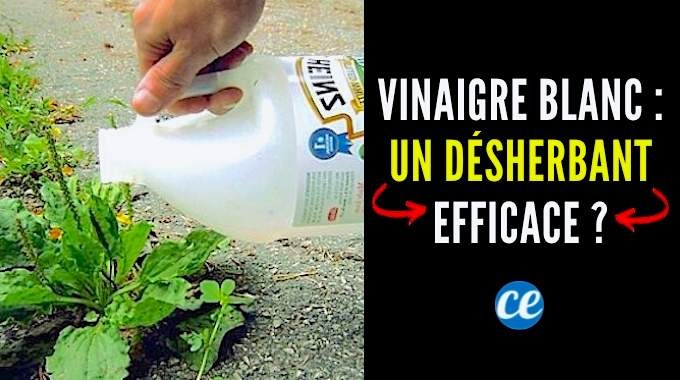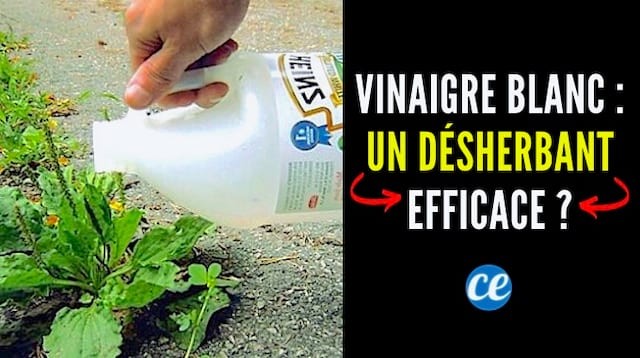
Is white vinegar really a natural and effective weed killer?
This transparent liquid is already renowned for its uses in the garden.
It is particularly an excellent insecticide and it also helps to acidify the soil of the plants.
But for it to be effective in the garden, it is essential to know how to use it correctly, and the right dosage to respect.
So, can you really use white vinegar to get rid of weeds?
Here is how to weed your garden naturally with white vinegar . Watch:

1. Grab your bottle of 10% white vinegar
2. When its dilution is 10%, count 1 liter to treat 10 m2 of soil surface.
3. If your garden is 50 m2, then 5L of white vinegar should be poured into the sprayer.
4. If you use white vinegar in an 8% dilution, the treated surface is slightly reduced to reach 40 m2.
5. With a sprayer, simply spread the pure vinegar on the surfaces to be treated.
6. Young shoots die directly, while the leaves of larger plants burn.
7. The weeds have all been dead for at least an entire year.
8. You can repeat the treatment 6 times a year.

There you go, you now know why and how to use white vinegar to do your weeding :-)
Easy, fast and efficient, right?
Finally, an efficient and above all completely natural treatment for treating paths, grass and lawns.
And even if it rains in the following days, regrowth is very difficult.
Count around €2.50 if you buy the product in a 10L container!
Do you realize?
We are far from the cost of conventional products sold on the market.
White vinegar is 92% water and 8% acetic acid.
What is acetic acid are you going to tell me?
This is what makes vinegar active, very active even . That's his secret.
But above all, don't worry; just because it says "acid" doesn't mean it's chemical.
Obtaining acetic acid is even a very natural process.
Thanks to the action of some bacteria, we ferment sugar and we obtain this famous compound.
You see, nothing chemical in there. White vinegar is simply good for your health.
Good on the other hand, you must not be sensitive to taste buds.
Its taste is harsh and pungent. Avoid drinking a glass of it.
Finally, even if it is not dangerous, also avoid getting it on the eyes and mucous membranes, or even breathing it in.
Now that you know what vinegar is made of, let's see why it's an effective herbicide.

Technically, any product that kills plants is considered a herbicide.
This is commonly referred to as a weedkiller.
And of course, when I talk to you about weed killer, you immediately think "Roundup".
It is true that this product is unfortunately one of the best known.
I say unfortunately, because this total weedkiller (meaning killing any plant around it) is very harmful.
But good news.
Did you know that since 2009, white vinegar is also officially part of total weedkillers?
Finally when I say white vinegar, it is more precisely acetic acid which is part of the official list.
Driveways, sidewalks, cultivated and arable areas, trees, shrubs; everything can be treated with acetic acid.
Under these conditions, it would be really wrong to do without it, and I'll explain why below.
Now you know there is a natural alternative to the deadly glyphosate.
Beyond the practical aspect, using vinegar is above all a way of not attacking nature or yourself .
We no longer poison ourselves, we no longer pollute groundwater or the surrounding nature.
This biodegradable product grills weeds without contaminating; and that's still a great advantage!
Due to its volatility and the doses used, its environmental impact is limited on soils and living beings.
It leaves no residue, unlike heavy harmful herbicides.
I told you; this product couldn't be more natural.
Even some plants contain acetic acid, that's telling you.
This miracle product can therefore be used without problems in all gardens.